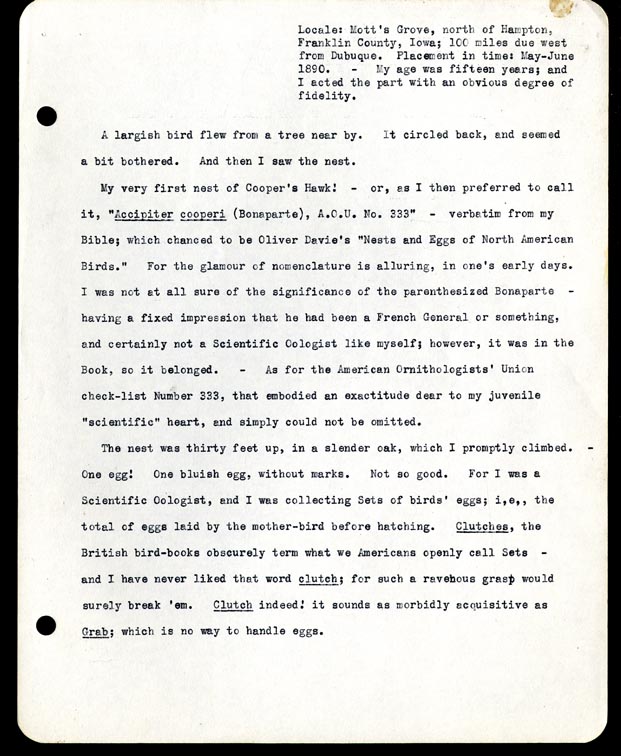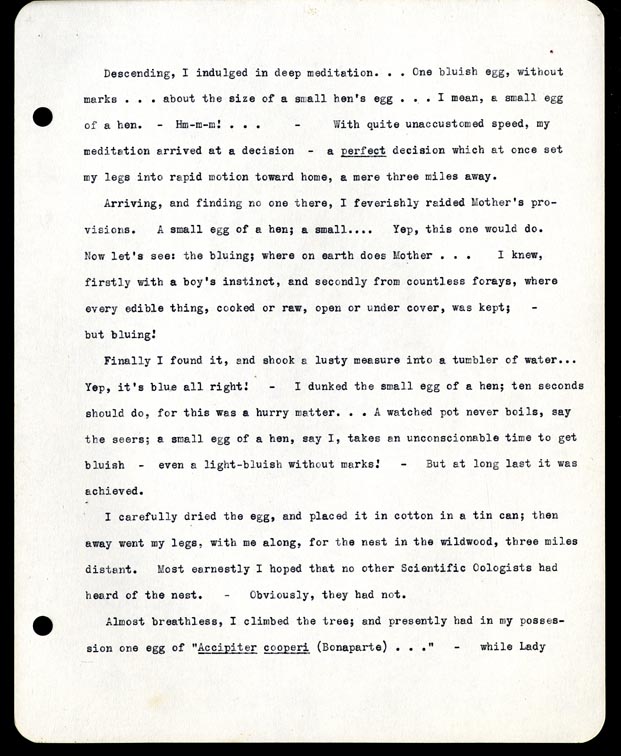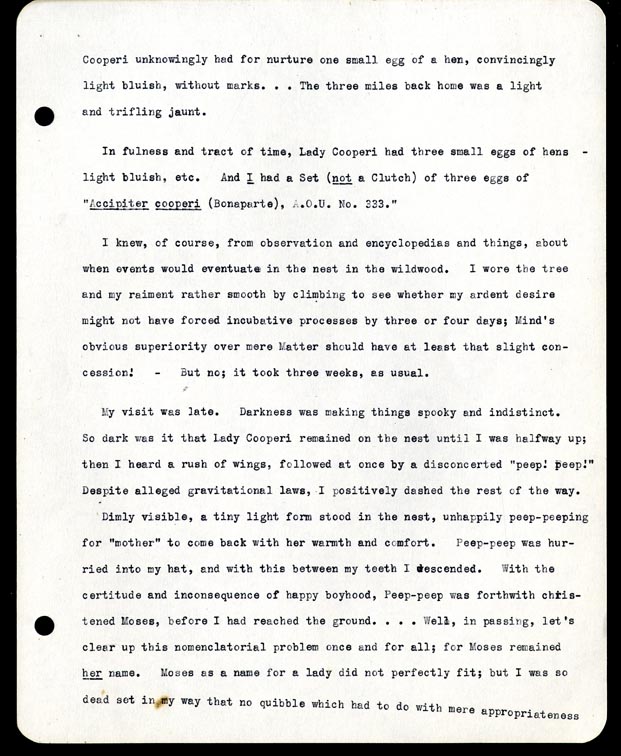Great Nebraska
Naturalists and Scientists
Frank H. Shoemaker
Mott’s Grove
1890
Locale: Mott’s Grove, north of Hampton Franklin County, Iowa; 100 miles due west
from Dubuque. Placement in time: May-June 1890. – My age was fifteen years; and I
acted the part with an obvious degree of fidelity.
A largish bird flew from a tree near by. It circled back, and seemed a bit bothered.
And then I saw the nest.
My very first nest of Cooper’s Hawk!– or, as I then preferred to call it, “Accipiter
cooperi (Bonaparte), A.O.U. No. 333” – verbatim from my Bible; which chanced to be
Oliver Davie’s “Nest and Eggs of North American Birds.” For the glamour of
nomenclature is alluring, in one’s early days. I was not at all sure of the
significance of the parenthesized Bonaparte – having a fixed impression that he had
been a French General or something, and certainly not a Scientific Oologist like
myself; however, it was in the Book, so it belonged. – As for the American
Ornithologists’ Union check-list Number 333, that embodied an exactitude dear to my
juvenile “scientific” heart, and simply could not be omitted.
The nest was thirty feet up, in a slender oak, which I promptly climbed. – One egg!
One bluish egg, without marks. Not so good. For I was a Scientific Oologist, and I
was collecting Sets of birds’ eggs; i.e., the total of eggs laid by the mother bird
before hatching. Clutches, the British bird-books obscurely term what we Americans
openly call Sets – and I have never liked that word clutch; for such a ravenous
grasp would surely break ‘em. Clutch indeed! It sounds as morbidly acquisitive as
Greb; which is no way to handle eggs.
Descending, I indulged in deep meditation. . . One bluish egg, without marks. . .
about the size of a small hen’s egg. . . I mean, a small egg of a hen. – Hm-m-m!… – With quite unaccustomed speed, my meditation arrived at a decision – a perfect
decision which at once set my legs into rapid motion toward home, a mere three miles
away.
Arriving, and finding no one there, I feverishly raided Mother’s provisions. A small
egg of a hen; a small . . . Yep, this one would do. Now let’s see: the bluish; where
on earth does Mother. . . I knew, firstly with a boy’s instinct, and secondly from
countless forays, where every edible thing, cooked or raw, open or under cover, was
kept; – but bluing!
Finally I found it, and shook a lusty measure into a tumbler of water. . . Yep, it’s
blue all right! – I dunked the small egg of a hen; ten seconds should do, for this
was a hurry matter. . . A watched pot never boils, say the seers; a small egg of a
hen, say I, takes an unconscionable time to get bluish – even a light-bluish without
marks! – But at long last it was achieved.
I carefully dried the egg, and placed it in cotton in a tin can; then away went my
legs, with me along, for the nest in the wildwood, three miles distant. Most
earnestly I hoped that no other Scientific Oologists had heard of the nest. –
Obviously, they had not.
Almost breathless, I climbed the tree; and presently had in my possession one egg
of
“Accipiter cooperi(Bonaparte) . . .” – while
In fullness and tract of time, Lady Cooperi had three small eggs of hens – light
bluish, etc. And I had a Set (not a Clutch) of three eggs of “Accipiter cooperi
(Bonaparte), A.O.U. No. 333.”
I knew, of course, from observation and encyclopedias and things, about which events
would eventuate in the nest in the wildwood. I wore the tree and my raiment rather
smooth by climbing to see whether my ardent desire might not have forced incubative
processes by three or four days; Mind’s obvious superiority over mere Matter should
have at least that slight concession! – But no; it took three weeks, as usual.
My visit was late. Darkness was making things spooky and indistinct. So dark was it
that Lady Cooperi remained on the nest until I was halfway up; then I heard a rush
of wings, followed at once by a disconnected “peep! peep!” Despite alleged
gravitational laws, I positively dashed the rest of the way.
Dimly visible, a tiny light form stood in the nest, unhappily peep-peeping for
“mother” to come back with her warmth and comfort. Peep-peep was hurried into my
hat, and with this between my teeth I descended. With the certitude and
inconsequence of happy boyhood, Peep-peep was forthwith christened Moses, before I
had reached the ground. . . Well, in passing, let’s clear up this nomenclatorial
problem once and for all; for Moses remained her name. Moses as a name for a lady
did not perfectly fit; but I was so dead set in my way that no quibble which had to
do with mere appropriateness


